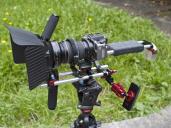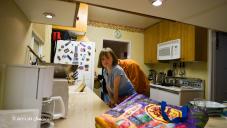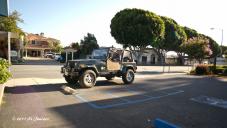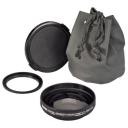
It allows to keep PV going, with more focus towards AI, but keeping be one of the few truly independent places.
-
Salute everyone,
Problem 1: The 2X crop factor of GH1 and GH2 which make 50mm lenses look like 100mm. It's not just a problem - it's a pain in the neck!
Problem 2: GH1 shoots in 16:9 aspect ratio, while most films today are made in 2:39:1
Possible solution 1: Use Anamorphic lenses or Anamorphic adapters.
BUT... LA7200, which made GH1 and GH2's 16:9 into a nice 2:39:1, is discontinued by Panasonic. The prices for LA7200 and anamorphic adapters and lenses have gone through the roof, and most people simply can't afford them.
Possible solution 2: use wider lenses and crop the top and bottom in post-production.
BUT... wide angle prime lenses are super expensive, and you are still really getting a usual 28mm shot out of your pricey 14mm pancake. And I still don't know how to get that nice Kubrick-style 14mm wide angle shot with my GH13...
So, I want to start a thread around this possible solution 3...
Possible solution 3: use those cheap (~£25-£60) 0.45X wide angle adapters from eBay that will make a 28mm lens behave more or less, like it should - like a 25mm. And a 14mm might finally appear like a nice 12.5mm...
The problem is... does it work? Has it worked for any GH1/2 users in this forum?
Which particular wide-angle adapter has worked well for you? And what about the sharpness, and loss of light-stops, and quality, and other issues?
If you have any information or experience with these wide angle adapters, please share. Because many of us, can't afford anamorphics or even decently wide lenses.
Thanks!
-
Cheap wide-angle adapters, regardless of how they're branded, will turn your sharp, high-resolution prime into a cheap wide-angle lens. Even the best wide-angle adapters will have barrel distortion, high susceptibility to lens flare and require a larger lens shade if not a full-scale matte box.
Some of the highest quality wide angle adapters are made by Century Optics and 16X9 Inc. These are priced in the $500+ range and are quite heavy. I've used a 16X9 0.7X HDV7X1 72mm with numerous primes and its quality is indeed very good:
http://www.amazon.com/16X9-Professional-Attachment-Panasonic-AG-DVX100A/dp/B000FLNWYK
While this particular 16x9 model is no longer in production, it can be found used on occasion. 16X9 currently makes a variety of wide angle adapters in various magnification ratios. I would not recommend an adapter with less than four internal lens elements or with a magnification ratio wider than 0.6X. -
They are very flare prone.
Many have huge abberations and distortion.
The main part.
I still do not understand why 14mm panckage is pricey.
It is not, as many taken from kits are available on ebay for cheap. -
Also keep in mind that the GH2 does NOT have a 2x crop. It is actually a 1.84, more or less identical to that of academy sized film.
-
Here's a photo of the 16X9 0.7X HDV7X1 wide angle adapter mounted on a Tokina AT-X 20-35mm f2.8 zoom lens. This rig is about as front heavy as I can comfortably handle.

 P1040578.JPG3136 x 2352 - 1M
P1040578.JPG3136 x 2352 - 1M -
@Gabel, is that for 16x9 mode? I've noticed the GH2 is actually windowing different parts of the sensor when you change the aspect in stills mode so I guess it all varies a little from one to the next. Good info though, thanks.
-
I want to try Sony adapters on my 14mm f2.5 as advertised in ebay auctions, anyone try it yet?
[quote]
With Sony VCL-ECF1 attached on it, the focal length of the lens will be become 8.7mm (0.62X) with Fisheye Effect.
With Sony VCL-ECU1 attached on it, the focal length of the lens will become 10.5mm (0.75X) which is an Ultrawide Angle Lens.[/quote] -
I have the Sony VCL-ECU1 (bought at B&H a couple of months ago when it was priced at $69). On the 14mm I find it outstanding, and it is very compact. I also have other wide angle adapters, the Olympus one bought used locally and a cheap one by Opteka. The Sony is the best by far on the 14mm... Al
-
-
-
Search: VCL-ECU1
in dpreview.com micro four-thirds forum to get lots of details, including photos from a japanese site that discovered this. Here are a couple of links:
http://forums.dpreview.com/forums/readflat.asp?forum=1041&message=39301864&q=VCLECU1&qf=m
http://forums.dpreview.com/forums/readflat.asp?forum=1041&message=39552520&q=VCLECU1&qf=m -
Here is smallest price for ECU1
http://www.bhphotovideo.com/c/product/713118-REG/Sony_VCLECU1_VCL_ECU1_Wide_Angle_Conversion.html
@aljimenez
I really want to ask you to share more your own pictures. -
OK, Here are some photos with the Sony VCL-ECU1 on the 14mm with a GH2

 P1030492.jpg4976 x 2800 - 5M
P1030492.jpg4976 x 2800 - 5M
 P1030100.jpg4976 x 2800 - 5M
P1030100.jpg4976 x 2800 - 5M -
-
Btw we have very inactive topic about ECU1
http://www.personal-view.com/talks/discussion/981/sony-vcl-ecu1-wide-angle-on-lumix-pancakes-#Item_2 -
Very nice indeed @aljimenez , would you have any sample footage to show us?
-
Here is a Vimeo clip of a test with the 14mm+Sony ECU1. The clip includes a Photo, ocean front with the sun head on (lots of sky banding) and a low light clip with little noise showing (NO NR applied). GH2 had firmware 1.1 (no hack) and shot with HBR (NTSC 30fps).
Perhaps I should have posted in the other thread VK mentions above? -
If anyone wants one I got a 16x9 HDV75X-82. One of the better wide angle adapters. Still makes your corners soft though if you go very wide.
-
I can also vouch for ECU1+14mm combo. Its a nice lightweight WA ;-)
-
This is not a wide-angle adapter, but I thought I'd throw it in here for comparison:
test videos of the Noktor / SLR Magic Hyperprime 12mm f/1.6
-
We have all this videos and text in 12mm topic.
-
I got another wide 0.8x Olympus adatper to use with my Panasonic 14mm f/2.5:
-
@kronstadt, there is good news in store for you. Your cameras are better than you think.
The "crop factor" you refer to is a ratio used by still photographers to compare the sensor size of a digital camera to 35mm still camera film. However, still-camera film and cinema film are not the same. SLRs thread 35mm sideways, with the sprockets at the top and bottom. In cine, this is called 65mm or VistaVision, and the frame is much bigger than normal movie film.
Cine cameras thread 35mm vertically, with the sprockets on the sides. The standard frame is called "Academy Aperture" for the Motion Picture Academy, or more commonly called "4-perf" because the active image area is four sprocket holes (perforations/perfs) tall.
Since you're shooting video, you want to compare your GH1/2 to movie cameras, not to still cameras. The M4/3 sensor is very close to 35mm 4-perf. (Let's leave the "crop factor" for stills, and start calling this "Cine factor.") The Cine Factor of M4/3 is 1.19. That means that an 11mm lens on a GH2 has the same AOV as a 15mm on a Panavision 35mm movie camera.
Here's a chart to help:
So you can get plenty wide enough if you need to. A "normal" lens (45-degree AOV) on a cine camera is 30mm; on the GH2, it's 25mm. As you go wider, the difference is less.
Since you like a cinematic 2.39:1 aspect ratio, you can crop the top and bottom of the 16:9 picture off, just like Jim Cameron did on Terminator 2 and Steven Spielberg did on Warhorse. They use a special camera that crops the 35mm frame down to 3-perf, which is about 2:39:1. This is called "Super35."
You don't need super-wide lenses to get a cinematic image. It's a lot closer than you realize.
Hope that helps.
-
Follow up on AdR's comments about the Super-35 format. He is correct about the use of slightly-wider lenses for a more cinematic appearance. One of my frustrations with consumer-grade camcorders was that their lenses were never quite wide enough. The lens specs he mentions are pretty much on the nose for 4/3 sensors.
I want to add something about the use of Super-35. That film spec was developed mainly to get a slightly larger original negative. Not only did this give filmmakers more leeway in reframing shots in post, but this enabled filmmakers to extract prints of high quality in nearly any image format they wanted. I remember reading a very detailed interview with James Cameron, where he talked about making widescreen prints of The Abyss for theaters, but also a full-frame 4:3 print for the home video market (back when this was an important concern). One trick he recommended was framing the shots from the top of the frame: he could crop from the bottom for widescreen, but if he wanted framing for 16:9 or 4:3, he'd crop less. The only thing he'd gain or lose was more of the actor's lower bodies.
-
@AdR You learn something every day! Thanks!
There's a wide angle converter for the 14mm pancake and the X 14-42 lens coming out sometime from Panasonic and if it is properly matched optically then it should be a good choice.
-
This 0,7x is for dslr's. It has a 58mm thread and comes with a 52mm adaptor ring. It's a german company known for years making good quality optical accessories. Try it in store on my 25mm nokton next week. Company homepage just in german, sorry. http://www.hama.de/00044336/hama-weitwinkel-objektiv-dslr-htmc-07x?bySearch=dslr&searchMode=1

 00044336abb.jpg350 x 350 - 25K
00044336abb.jpg350 x 350 - 25K
Howdy, Stranger!
It looks like you're new here. If you want to get involved, click one of these buttons!
Categories
- Topics List23,988
- Blog5,725
- General and News1,353
- Hacks and Patches1,152
- ↳ Top Settings33
- ↳ Beginners255
- ↳ Archives402
- ↳ Hacks News and Development56
- Cameras2,365
- ↳ Panasonic994
- ↳ Canon118
- ↳ Sony156
- ↳ Nikon96
- ↳ Pentax and Samsung70
- ↳ Olympus and Fujifilm100
- ↳ Compacts and Camcorders300
- ↳ Smartphones for video97
- ↳ Pro Video Cameras191
- ↳ BlackMagic and other raw cameras116
- Skill1,960
- ↳ Business and distribution66
- ↳ Preparation, scripts and legal38
- ↳ Art149
- ↳ Import, Convert, Exporting291
- ↳ Editors191
- ↳ Effects and stunts115
- ↳ Color grading197
- ↳ Sound and Music280
- ↳ Lighting96
- ↳ Software and storage tips266
- Gear5,420
- ↳ Filters, Adapters, Matte boxes344
- ↳ Lenses1,582
- ↳ Follow focus and gears93
- ↳ Sound499
- ↳ Lighting gear314
- ↳ Camera movement230
- ↳ Gimbals and copters302
- ↳ Rigs and related stuff273
- ↳ Power solutions83
- ↳ Monitors and viewfinders340
- ↳ Tripods and fluid heads139
- ↳ Storage286
- ↳ Computers and studio gear560
- ↳ VR and 3D248
- Showcase1,859
- Marketplace2,834
- Offtopic1,320
Tags in Topic
- anamorphic 153
- wide-angle 14
- adapters 10
- aspect 5
- aspect-ratio 1










